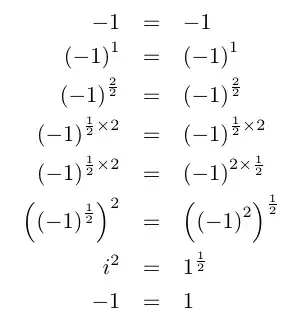Which of the following steps is wrong?
- 209,954
- 119
-
2I feel like this question has been asked before and is a dulplicate of some other question... – Crescendo Nov 29 '17 at 19:03
-
$(a^b)^c=a^{bc}$ does not hold ! – Nov 29 '17 at 19:06
-
@user171780 If you are ok, you can set as solved. Thanks! – user Dec 03 '17 at 11:42
5 Answers
For x a positive real numbers, $\sqrt[b]{x^a}= x^{a/b}= (x^{1/b})^a$. But that is not true for x a negative number when the root might be imaginary.
- 18,710
When you work with complex numbers,the square root isn't an operation that gives you just one value, it gives you 2 different values (a number and its opposite). So the square root of 1 can either be 1 or -1.
- 3,344
The issue you are having is that taking roots is not a well defined function. Note that both $-1$ and $1$ are suitable answers to $ \sqrt{(-1)^2} $.
In particular, in the second to last step you are choosing a specific root for each argument, choosing $1$ instead of $-1$ for $((-1)^2)^\frac{1}{2}$.
For a better understanding of this idea, look up roots of unity.
- 796
I think we can not say $(i^2)^{1/2}=(i^{1/2})^2 $in this case :
As : $\sqrt{x^2}\neq (\sqrt{x})^2$ In complex numbers
- 215
- 1
- 7
in the complex $\sqrt{1}=\pm1$ thus equality holds, even if a solution has been lost
to better explain why a solution has been lost lets consider a generic complex number $w$
case 1: $\sqrt{w}=z_1,z_2 \rightarrow z^2_1,z^2_2=w$
case 2: $w^2=v \rightarrow \sqrt{v}=w_1,w_2$
and at least one between $w_1,w_2$ is equal to $w$.
- 154,566
